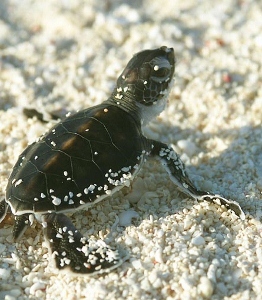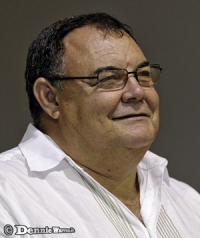Archive for January 17th, 2013

CIG faces cash flow issues
 (CNS): Government has denied that it will necessarily need to ask the UK for an extension to its overdraft when a delegation from the new minority government heads to London at the weekend. However, Rolston Anglin has acknowledged that budget discussions will form a key part of the talks between the Cayman team and Mark Simmonds, the UK minister, when they meet him. Sources tell CNS that although this is the month when the government traditionally collects a significant part of its revenue, it is still struggling to pay bills and manage the public coffers.
(CNS): Government has denied that it will necessarily need to ask the UK for an extension to its overdraft when a delegation from the new minority government heads to London at the weekend. However, Rolston Anglin has acknowledged that budget discussions will form a key part of the talks between the Cayman team and Mark Simmonds, the UK minister, when they meet him. Sources tell CNS that although this is the month when the government traditionally collects a significant part of its revenue, it is still struggling to pay bills and manage the public coffers.
Speaking at the now regular weekly press briefing on Thursday morning, the deputy premier, who will be one of eight people going on the London trip, said government was monitoring its overdraft position and officials were waiting until the end of this week as more of the fees from the financial services sector continues to come in before they make any decision. He said there was no intention yet to extend the overdraft but cash flow issues and the budget itself will feature heavily in the London talks.
Rolston Anglin said that Richard Holmwood, the UK’s economic advisor assigned to the overseas territories, had been on island for his regular visit to review the budget performance, which Anglin welcomed, adding that it assisted in building credible, sustainable budgets.
However, it appears that the administration continues to face problems with cash flow in the face of persistent complaints that government bills are not being paid as finances appear to be stretched to the limit.
The Cayman Islands Government (CIG) cannot extend its borrowing any further under the conditions it agreed with the Foreign and Commonwealth Office (FCO) following its approval of Cayman’s 2012/13 budget in August. In addition, there can be no appropriations to this financial year’s spending plans, which means no government departments will be able to spend more than the money they were given in that August budget. The budget was delivered more than two months late after McKeeva Bush, the former premier and minister of finance, was unable to prepare a budget that met with UK approval before the end of the 2011/12 financial year.
With the UK now keeping a closer eye on Cayman's government spending and revenue collection, it is not clear whether the CIG will be forced to ask the UK for more short term borrowing, or if it does, how the UK will respond given its position on the size of Cayman’s debt in relation to its revenue.

Farm claims success with return of nesting turtle
 (CNS): In the face of mounting financial woes and international pressure from activist groups, the Cayman Islands Turtle Farm said the return of another farm turtle to nest in Cayman was an indication of the success of its conservation programme. A turtle nesting on Seven Mile Beach at the Grand View was discovered to be one tagged and released from the farm in 1987, officials said. This one turtle adds to a list of only 60 turtles from 31,000 released over the last 45 years that have actually come back to nest. Nevertheless, the addition was marked by the farm as important evidence that the tagging programme works.
(CNS): In the face of mounting financial woes and international pressure from activist groups, the Cayman Islands Turtle Farm said the return of another farm turtle to nest in Cayman was an indication of the success of its conservation programme. A turtle nesting on Seven Mile Beach at the Grand View was discovered to be one tagged and released from the farm in 1987, officials said. This one turtle adds to a list of only 60 turtles from 31,000 released over the last 45 years that have actually come back to nest. Nevertheless, the addition was marked by the farm as important evidence that the tagging programme works.
From the 31,000 that have been released into the wild, 24,000 of those turtles were tagged and 4,500 given ‘living tags’ — a technique pioneered by Professor John Hendrickson and Lupe Hendrickson of the University of Arizona.
“This discovery in early January has been of significant importance because yet another ‘living tagged’ female demonstrates that turtles released by the Cayman Turtle Farm are continuing their life cycle by successfully nesting on Cayman’s beaches. It is always particularly heartening when one of our own turtles returns home to breed,” Walter Mustin, the farm’s chief research officer, said in a release.
In recent years the farm has selected around a dozen juvenile turtles at about one year old to be released. In the past the numbers were far greater but following the decimation of the farm by Hurricane Michelle in 2001 the numbers in the release programme were dramatically reduced and there were several years in which no turtles were released at all.
Once released, the turtles spend as much as ten years in the ocean before returning to the coast, foraging for food and slowly maturing. It is estimated that it takes a turtle between 20 and 30 years to reach sexual maturity in the wild, and once they do, they migrate to nesting areas to breed. Females come ashore to lay their eggs, frequently to the same spot where they were born, although this is not always the case.
“Our tagged turtles may well begin nesting in other locations apart from Grand Cayman,” said Geddes Hislop, the farm’s curator. It is not possible, therefore, for the farm to say how many of the female turtles in the remaining 30,939 animals that were released have survived.
The baby turtles in this latest nest were among the last to hatch this season after a fall in temperature delayed several of the nests from hatching. The farm said that about 30 eggs hatched but no live turtles were found and around 70 unhatched eggs were discovered by the Department of Environment’s research officer, Janice Blumenthal, and her colleague Paul Chin.
Hislop said the discovery was a great start to the year. “Seeing the results of our head starting programme takes many years of patient waiting so this recent find is a testament to the programme’s ultimate success.”
However, there is a continuing campaign against the Turtle Farm following the findings of the charity World Society for theProtection of Animals (WSPA) that documented a catalogue of problems relating to the condition of the turtles and the husbandry practices at the facility, and the discovery of just one new nesting female from the farm is unlikely to make 2013 a happy year for the struggling tourism attraction.
A report from a review commissioned by the farm is expected to be published shortly in connection with the damning findings of the charity, which farm officials have disputed. However, the WSPA is expected to increase its campaign this year toturn the farm into a real conservation facility.
The latest revelations in the farm’s own annual report have also done little to help improve the image of the Cayman Turtle Farm. The report showed that the farm is breaching the terms of its permit to discharge waste into the ocean as it has failed to reduce the effluent. Even more damaging is the massive losses still being sustained at the farm — a bill which is being picked up by the Caymanian tax payer.

CJ issues legal aid warning
(CNS): The issues that have taken centre stage for the local judiciary over the last four years remained front and centre as the courts started the judicial year on Wednesday at the Grand Court opening. Giving his customary reporton the past year and the hopes for the year ahead, Anthony Smellie, the Chief Justice, highlighted once again the issue of legal aid in the face of a proposed bill with which he has fundamental concerns. He pointed out that while the current system needed some reform it provided value for money, was not escalating in cost and ensured all those facing serious criminal charges had funding for a lawyer.
Smellie said that the draft Legal Aid and Pro Bono Legal Services Bill 2012, which was circulated last year for public comment, could be counterproductive as it may drive the already select few lawyers doing legal aid work away, creating a far greater problem at a time when the bill of rights now enshrines the right to representation. He warned that the bill of rights obligated government to fund qualified lawyers for those charged with serious criminal offences and who could not afford to pay for representation.
The bill, which was circulated last year, compels all lawyers to provide their services pro bono for 25 hours per year or make an annual contribution to the court of $2,500. With just a handful of lawyers in Cayman willing and qualified to do criminal defence legal aid work, the Chief Justice said forcing people to work pro bono could drive them away and be counterproductive. Obligating lawyers without experience in criminal defence work could also harm those people who need defending the most.
Legal aid has become something of a political football since the last elelction but its costs throughout the last four years have remained stable. The chief justice said that the perception of escalating costs was unfounded with the appropriation remaining around $1.8 million every year, despite the massive increase in legal cases. Last year 557 defendents in the criminal courts were funded via legal aid and represented by the handful of local lawyers willing to undertake the work.
The bill has now been sent to the Law Reform Commission, which had previousluy undertaken a report about legal aid, in which it concluded that the current system, that is managed directly by the courts, represented good value for money though required some reforms.
Smellie urged legislators to settle the matter of legal aid once and for all but he warned that the more elaborate the legislation, the more unwieldy and expensive things would become.
With government resources limited, the chief justice raised the issue of the long shelved plans for a new court house, but he said its delay was now presenting a very real problem. In a new constitutional era with enshrined human rights, delays in justice could present legal problems for government and the tax payer. He said the judicial system was in desperate need of a new court house.
He pointed out that there are only two secure courtrooms and most of the time judges and magistrates in the criminal courts are pressed to find a courtroom to sit in, given the escalating number of criminal cases in which defendants are often in custody.
Smellie said the courts needed to be running at least three trials a week in the Grand court alone if they were to dispose of the caseload within a reasonable time frame. At present the average is still 300 days from charge to trial, much longer than the international standard of 180.
The current courthouse was built some 40 years ago and the chief justice pointed to the pressing need for a modern facility to accommodate the needs of the various specialist courts as well as the criminal trials. He said it was very important that progress was made on the development of the new court this year.

Lawyer throws hat in ring for GT showdown
 (CNS): Another independent candidate has declared his intention to run in George Town in the May General Election. Local lawyer Winston Connolly said on Thursday that he would be contesting a seat in the capital, adding that two months ago such a bid was “inconceivable”. Connolly remained tight lipped on what drove him to join the political fray in his press release announcing his candidacy, stating that it was for several reasons that would be revealed during his campaign. Connolly said he would be seeking C4C endorsement and is believed to be one of the candidates the group will endorse. Like his fellow C4C candidate Roy McTaggart, who declared Tuesday, Connolly has not yet set out his policy position on any of the major issues that will dominate the campaign.
(CNS): Another independent candidate has declared his intention to run in George Town in the May General Election. Local lawyer Winston Connolly said on Thursday that he would be contesting a seat in the capital, adding that two months ago such a bid was “inconceivable”. Connolly remained tight lipped on what drove him to join the political fray in his press release announcing his candidacy, stating that it was for several reasons that would be revealed during his campaign. Connolly said he would be seeking C4C endorsement and is believed to be one of the candidates the group will endorse. Like his fellow C4C candidate Roy McTaggart, who declared Tuesday, Connolly has not yet set out his policy position on any of the major issues that will dominate the campaign.
In a release announcing his candidacy in the critical six seat district of this campaign, he said he felt compelled to put his hat, and experience, in the ring.
Connolly said he intends to focus on struggling families, professional advancement, education and local and global challenges facing all Cayman residents but he did not specify his position on the major issues.
“People who love their country can change it. Some of our previous statesmen recognized this. It is through political will, hard work and perseverance that we can move Cayman forward in the right direction,” he said.
Connolly spoke about wanting to meet with constituents to gain an understanding of their primary concerns as it is his intention to address them. He said that there were several challenges ahead but was enthusiastic and determined to face them.
As an individual he is not the answer, the independent candidate said, but together with likeminded, patriotic Caymanian leaders no problem is too big to resolve. He did not say which side of the Legislative Assembly those like-minded individuals would be if he were elected to office.
Connolly did say, however, that voters who want, and by all rights should demand, a more accountable government and a better country, ought to come out to support him and these other like-minded individuals.
“We need all hands on deck. The time for partisan politics is over. We need to work together and use all the resources we have to right the Good Ship Cayman. In so doing, we may better understand each other and move ahead as a stronger community and country that is based on mutual respect and understanding of each other,” he added.
“Politics which shuts you out if you are in the 'wrong' party, politics which tells you to settle for the status quo only divides us all. Our heritage was built on the premise that we are one people,” Connolly said in his announcement release.

YCLA reveals 2013 finalists vying for annual gong
 (CNS): Michael Blackburn, Marzeta Bodden, Victor Crumbley, Melanie Scott and Shomari Scott are the five finalists who will be chasing the title of Young Caymanian Leader this year. Now in its 14th year, the nominees for the annual award were announced by Jonathan Tibbetts, the 2006 YCLA recipient recently. The winner will be crowned in March at the televised awards ceremony at a black tie gala at The Ritz-Carlton. The evening and weeks leading up to the event focus heavily on the leadership and accomplishments of candidates, who were selected from a large group of what the organisers said were impressive nominations .
(CNS): Michael Blackburn, Marzeta Bodden, Victor Crumbley, Melanie Scott and Shomari Scott are the five finalists who will be chasing the title of Young Caymanian Leader this year. Now in its 14th year, the nominees for the annual award were announced by Jonathan Tibbetts, the 2006 YCLA recipient recently. The winner will be crowned in March at the televised awards ceremony at a black tie gala at The Ritz-Carlton. The evening and weeks leading up to the event focus heavily on the leadership and accomplishments of candidates, who were selected from a large group of what the organisers said were impressive nominations .
“The YCLA selection committee was presented with an almost insurmountable task; a task to identify five finalists out of so many suitable candidates who embody the mantra of the Young Caymanian Leadership Award. The five finalists are certainly upstanding young leaders in our communities and they hail from all throughout the islands,” said Jonathan Tibbetts, Chairman of the Nomination Sub Committee.
“The decision process was approached with great care and attention to detail. The members spent much time reviewing, confirming and questioning the submissions. The five finalists were selected for their dedication to growing our island and young people; their discipline in their careers and volunteerism; and their desire to change the islands for generations to come.”
The event takes place on Saturday 23 March.

MLA queries booze ads
 (CNS): The independent member for North Side wants the local authorities to start enforcing the law which bans liquor advertising. Ezzard Miller has written to the director of public prosecutions (DPP) asking what legal authority is allowing the police, the Liquor Licensing Board and her office to ignore the provisions of the Tobacco Product and Intoxicating Liquor Advertising Law, which prohibits the promotion of both booze and cigarettes. Miller says he has concerns about the amount of promotion that alcohol gets in Cayman and increases in binge drinking among young people. (Photo by Dennie Warren Jr)
(CNS): The independent member for North Side wants the local authorities to start enforcing the law which bans liquor advertising. Ezzard Miller has written to the director of public prosecutions (DPP) asking what legal authority is allowing the police, the Liquor Licensing Board and her office to ignore the provisions of the Tobacco Product and Intoxicating Liquor Advertising Law, which prohibits the promotion of both booze and cigarettes. Miller says he has concerns about the amount of promotion that alcohol gets in Cayman and increases in binge drinking among young people. (Photo by Dennie Warren Jr)
“This matter of illegal advertising of alcohol is serious. The National Drug Council reports that binge drinking of alcohol increased from 7% in 1998 to 32% in 2010 among teenagers in 7 to 12 grades,” the MLA told CNS this week. “It’s an alarming increase, and while it cannot all be attributed to the advertising of alcohol, a large amount of it is.”
In his letter to the DPP, he points out the provisions in section 4 of the law that states: “No advertising concerning tobacco products or intoxicating liquor shall be broadcast from within the Islands or shown on any cinematograph display.”
The penalty, he says, is a fine of one thousand dollars, but although there is considerable advertising and promotion of liquor all over Grand Cayman as well as on vans, in the local press and flags outside bars, no one is being prosecuted, even though it is an opportunity for government to collect hundreds of thousands of dollars in fines.
The money collected, he said, could be given to the National Drug Council and their programmes aimed at preventing alcohol and other drug abuse. The NDC has persistently stated that booze is Cayman’s most problematic drug and while illegal drugs are misused, the levels of alcoholism and dependency are a very real issue in Cayman society. Miller said that the liquor companies know the value of advertisements because they are very effective, as the increase in young drinkers demonstrates.
“A review of the last several years of the surveys done by the National Drug Council will indicate that the average age of alcohol consumption is trending downward, while liquor distributors, both wholesale and retail, reap the benefits,” he added.
Having raised the matter of the illegal advertising of alcohol in the Legislative Assembly, during his regular appearances on the Rooster talk show and in the media, Miller said there has been no response from the authorities.
“I have to assume that there is some legal authority of which I am not aware, which allows this to continue,” Miller states in his letter to the DPP. He pointed to the frequency with which the police and the DPP enforce the Misuse of Drugs law, which he said he supports, but the authorities appear not to be enforcing the tobacco product and intoxicating liquor law.
"The effects of the continued 'turning a blind eye' on the liquor establishments and the media outlets that facilitate them may be even worse, as it is a scientific fact that alcohol is the most frequently used “gateway” drug and it is counterproductive to allow the liquor establishments to overcome the setbacks caused to their sales by those who promote through education a reduction in the consumption of alcohol", Miller wrote.
As one of the members who passed the law in 1986, the North Side MLA added that the terrible effects of alcohol abuse on society were well documented, which is what prompted the members to pass the law in the first place.
In the letter Miller also points to the topical issue of the Legal Practitioners' Law. Against the backdrop of the debate about the new bill, he said he had learned that local law firms are recruiting non-Caymanians in foreign countries to practice Cayman law related to the financial industry, "knowingly in violation of the current Legal Practitioners Law, so much so that they are now holding the new Legal Practitioners Bill to ransom,” he added in his letter.
He said that he believed Cayman law firms who employ lawyers not admitted to practice law in this country but to do so in other jurisdictions, could be guilty of an offence under the existing law.
“Information coming to me from the legal fraternity in the Cayman Islands to try and persuade me to support the Legal Practitioners Bill in its current form, that includes provisions that will attempt to control and legalize this practice, indicates that such practice is wide spread and represents millions if not billions of dollars in income to these firms,” he said. This position appeared to be confirmed by the Law Reform Commission and revealed by Ian Paget-Brown at the Grand court on Wednesday.
Miller asked the DPP to provide him with the legal authority that allows the offence to take place or explain how such practices are not offences against the law. He said he was “reluctant to conclude” that there was selective enforcement of laws, such as the marine law on the one hand and the legal practitioners' on the other, because those who contravene that law have the resources to challenge its enforcement.
Miller also pointed out how one attorney involved with the ill-fated Tempura investigation was disbarred in his home jurisdiction for a similar offence, illustrating that this was not a trivial matter. He said particular laws should not be ignored by the authorities, when the people have entrusted them to enforcee all laws passed by their elected representatives.
See Miller's letter below